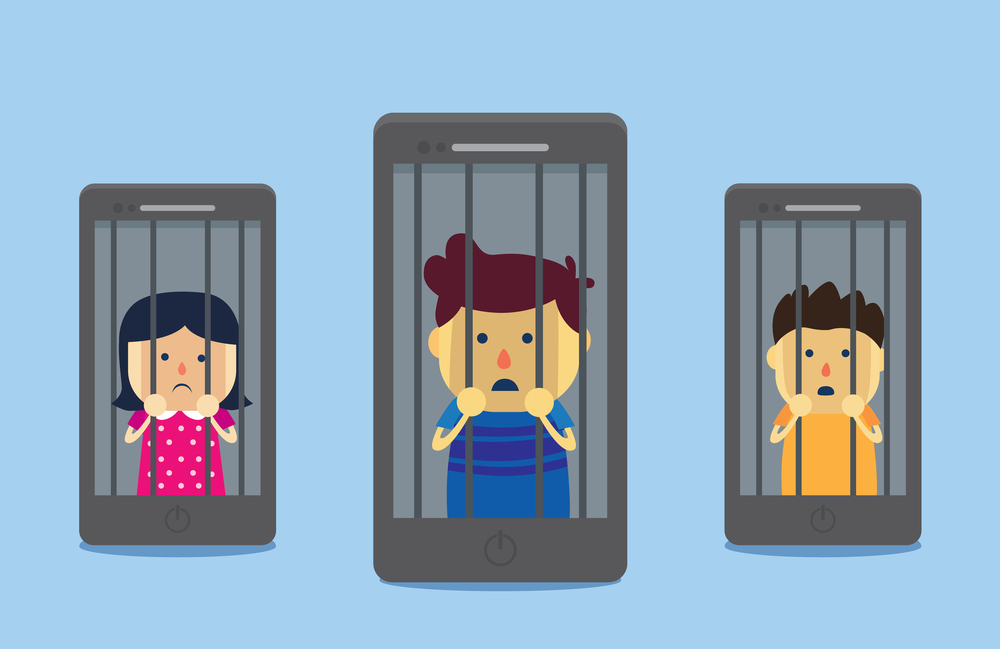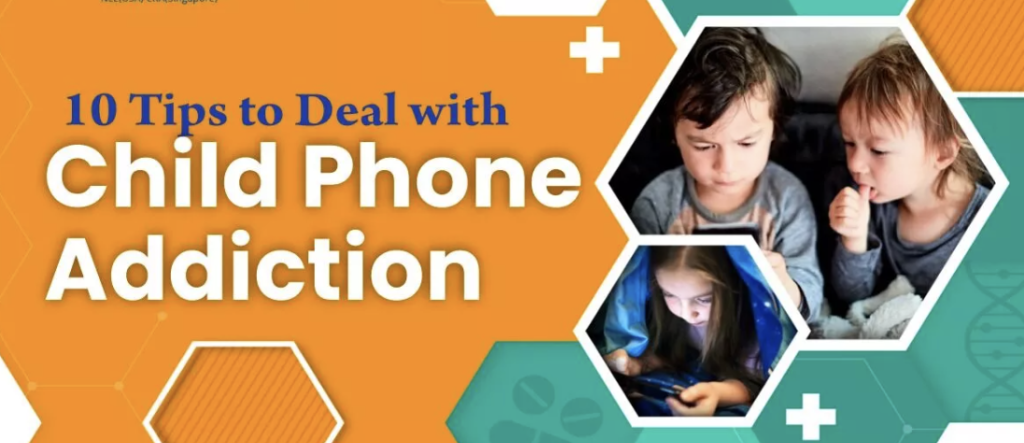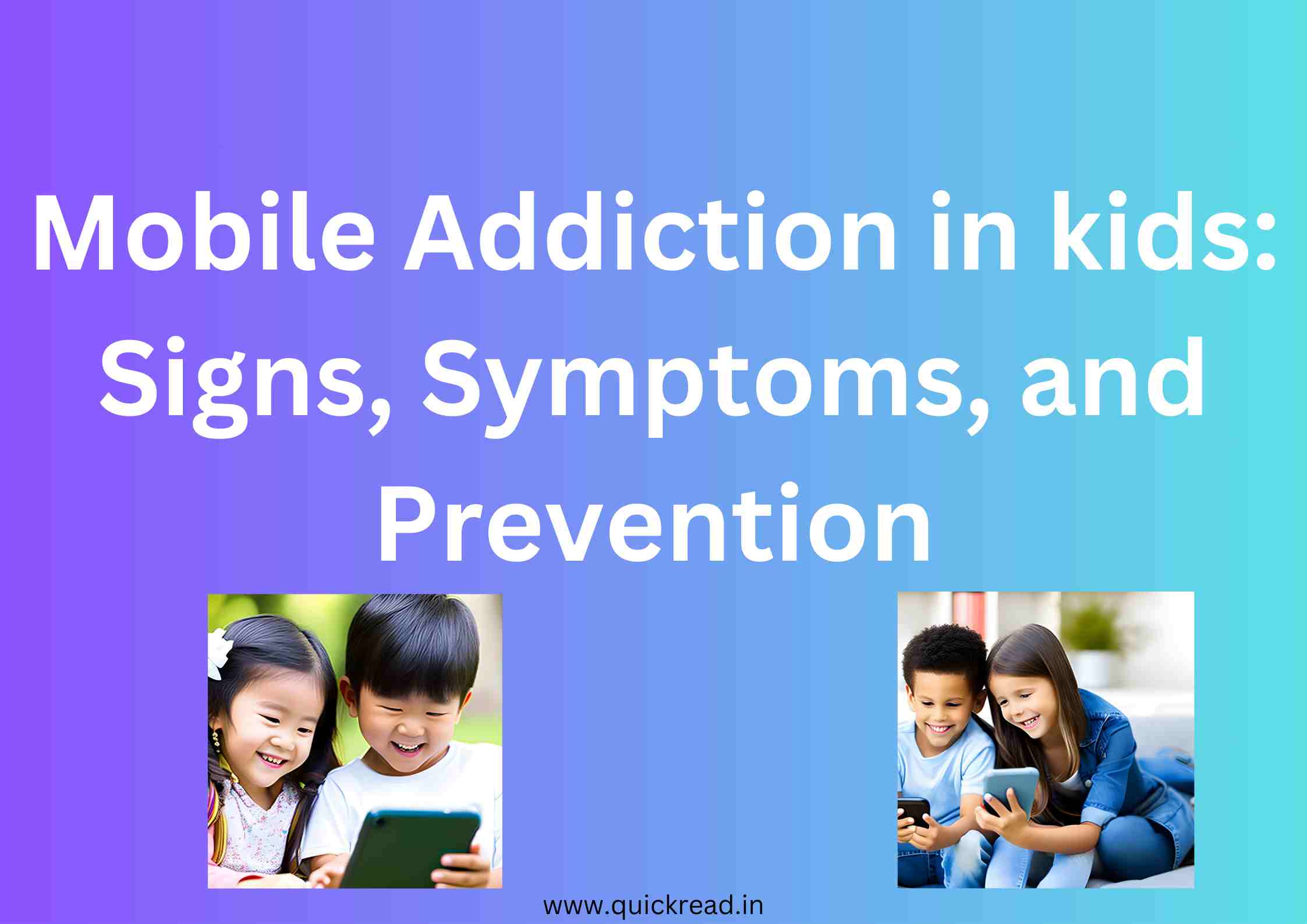Introduction
Mobile Addiction in kids: The ubiquity of mobile devices in today’s world has led to kids spending more and more time glued to phone and tablet screens. While technology offers many benefits for learning and development, uncontrolled mobile usage can negatively impact children’s mental and physical health. As responsible parents and guardians, understanding this growing phenomenon of mobile addiction and taking constructive steps to manage it is essential.
What is Mobile Addiction?
Mobile addiction refers to excessive dependence on mobile devices to the extent that it interferes with other important activities and causes emotional distress. Psychologists classify it as a behavioral addiction akin to gambling addiction or Internet addiction disorder.

Some red flags of mobile addiction in kids are:
- Spending several hours per day on the mobile outside of productive needs
- Constant distraction and checking of the phone
- Preference for mobile use over social activities or hobbies
- Inability to control mobile use even after setting rules
- Feelings of anxiety when the mobile is not accessible

Problematic mobile use starts affecting a child’s ability to focus, their sleep patterns, real life relationships and emotional stability. Prioritizing mobile addiction treatment becomes vital at that stage.
Causes of Mobile Addiction in Kids
Mobile addiction does not happen overnight. It is the result of several factors that create dependence:
1. Brain’s reward system
The notifications, alerts, updates and content feeds activate the pleasure centers in kids’ brains making mobile usage rewarding. Their developing brains start craving these dopamine hits.
2. Fear of missing out (FOMO)
Being perpetually connected comes with the fear of missing out on something happening in their friends circle. This drives obsessive checking.
3. Lack of self-control
Young kids do not have fully developed self-regulation abilities. They struggle to control impulses and get distracted easily.
4. Escapism
Shy and socially awkward kids may turn to mobiles as it feels less intimidating than facing real world social situations.
5. Lack of alternate hobbies
Limited exposure to outdoor activities or creative arts leaves a void that extensive mobile usage aims to fill.
6. Poor parenting habits
Permissive or inconsistent mobile usage rules, lack of supervision, using mobiles as pacifiers further ingrain smartphone dependence in kids.
A combination of such factors results in kids becoming hooked to their devices.

Harmful Effects of Mobile Addiction
Uncontrolled mobile usage can profoundly impact children’s physical health, mental well-being, real life social skills and overall growth.
Physical effects
- Obesity and weight gain
- Postural and musculoskeletal issues
- Eye strain and headaches
- Sleep deprivation
Mental effects
- Attention and learning problems
- Low self-esteem and confidence
- Depression, anxiety and loneliness
- Poor social awareness and etiquette
- Aggression and tantrums
Social effects
- Weakening of family bonds
- Lack of interaction with friends
- Behavioral issues
- Poor academic performance
- Social withdrawal
Tips for Parents to Manage Mobile Addiction

Parental intervention is crucial to help kids develop a healthy mobile usage pattern. Here are some tips for parents:
- Set time limits and use tracking tools to restrict daily mobile usage
- Designate device-free family time with fun group activities
- Do not allow mobiles during meals and before bedtime
- Install parental control apps to block inappropriate content
- Set up focused usage rules like no social media under 13 years
- Encourage outdoor games and creative hobbies
- Teach kids to manage FOMO and identify mobile triggers
- Avoid using mobiles as pacifiers or rewards
- Seek professional help if addiction is severe
With patience and the right strategies focused on restraint and engagement, parents can nurture healthy mobile habits in kids that balance fun and learning without addiction.
Signs that Your Child Has a Healthy Mobile Usage Pattern
When mobile usage is kept within reasonable limits through parental guidance and discipline, children demonstrate behaviors like:
- Ability to self-regulate and close apps when required
- Acceptance when mobiles are unavailable or usage limits reached
- Preference for playing with toys or friends over mobile when given a choice
- Engagement in family activities without resistance
- Well-rested with adequate sleep
- Maintaining hobbies and outdoor interests
- Socially courteous online and offline behavior
- Good academic performance
Such signs indicate that mobile usage has been optimized for learning and development rather than addiction. Children can reap the many benefits of mobile technology while minimizing its harms.
Conclusion
Raising kids in today’s digital era comes with its challenges, but with careful monitoring and correcting excessive mobile use, parents can avoid addiction pitsfalls. The key is to intervene early when problematic signs emerge, set boundaries and provide engagement alternatives. Seeking professional counseling is also recommended for chronic addiction. With diligence and cooperation from schools, parents can ensure mobiles enhance children’s growth journey rather than derail it.


